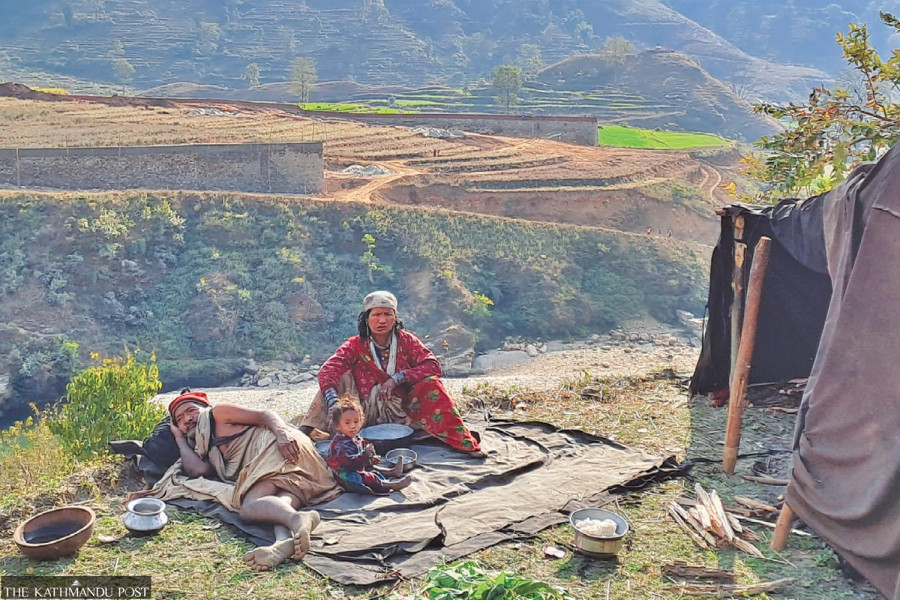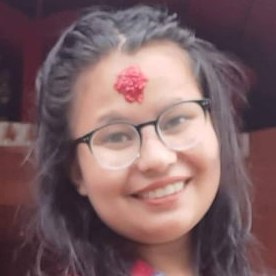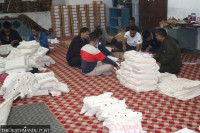National
Lack of care, alcoholism contributing to high infant mortality in Raute community
In Karnali, almost half the Rauti children die in infancy, according to the provincial planning body.
Tripti Shahi
Subidha Shahi gave birth to a baby boy on August 19, 2020. On that day, she had received her social security allowance from the government so she named her baby Sarkari Shahi. But her infant did not survive beyond a month and a half of his birth.
Subidha is from the Raute community, a nomadic tribe, living in the forests of Karnali and dependent on the forest resources for their subsistence.
Raute people do not live in one area for extended periods, which they believe is a sustainable way to prevent the depletion of forest resources. Until a couple of days ago, Subidha and her community members were living in a forest in the Jhyali forest area of Gurans Rural Municipality-8, Dailekh district.
Another Raute woman, 27-year-old Minu Shahi, gave birth to twins in July 2018 when they had camped for around five months in the Jhyali forest area.
The twins died in their neonatal phase.
Most women from her community experience shared grief of losing one’s child prematurely, Minu told the Post.
“I have never felt the joy of being a mother as both my children died within a month,” she said.
Almost half the children born in the Raute community in Karnali die in infancy, according to the Karnali Province Planning Commission.
Health professionals say most infant deaths in the community are caused by lack of proper nutrition and care for the child and the new mother.
“During pregnancy, the expecting mother does not get to eat a balanced nutritious diet. They thus give birth to unhealthy babies which ultimately leads to the infant’s premature death,” said Dr Dipendra Rokaya, former member of the Karnali Province Planning Commission. “The Raute community lives in poverty and is cut off from modern medicine to ensure safe pregnancy and birth.”
Kamal Sharma, a health worker in Gurans Rural Municipality, said most pregnant women from the Raute community give birth in unsafe environments in their forest dwellings. “They refuse institutional delivery,” said Sharma. “They prefer home births without the help of experienced hands. They keep moving from place to place so it’s difficult to keep track of them to provide postnatal care to the mother and her newborn.”
“During and after pregnancy, the mother lacks care which affects the baby’s health. Also, early marriage and teen pregnancy are rife in the community, complicating childbirth,” said Sharma.
According to Sharma, another reason that impedes good health practices in the community is widespread alcoholism. “Even during pregnancy, women abuse alcohol, which affects their health and that of their babies and this could lead to neonatal deaths,” said Sharma.
Authorities in Karnali have not maintained a database of infant deaths in the Raute community in the province, Padma Bahadur KC, information officer at the Karnali Province Health Directorate, told the Post.
“It’s a difficult undertaking as the community members adhere to their traditions and beliefs,” KC said. “They are not open to probing by outsiders. We haven’t been able to collect much data on their birth and death numbers.”
However, according to Lal Bahadur Khatri, a social worker who has been following the Raute community in the province since June 2018, 15 infants have died soon after their birth while one was stillborn in the past three and a half years.
The Social Service Centre (SOSEC), an NGO that conducts awareness programmes on the importance of education and sanitation, has arranged for two ‘teachers’, including Khatri, to live in close proximity with the Raute people, helping them improve their living standards and hygiene practices and to focus on overall social development of community members. The appointed teachers spend their days interacting with the community and live as paying guests in nearby villages.
Khatri says the infant mortality rate in the Raute community is high due to a lack of vaccination, balanced nutritious diet and pre and post-natal care, and other major factors being improper hygiene and poor living conditions.
“They live in flimsy huts which offer little protection from hot or cold weather,” said Khatri. “They sleep on the hard floor and the babies and children fall ill to pneumonia, sometimes leading to their deaths.”
According to Gogan Bahadur Hamal, the chief district officer of Dailekh, there are 43 Raute families with a combined population of 143 in the district.
As per the national census carried out by the Central Bureau of Statistics in 2011, there are approximately 618 Raute people in Nepal.
The government has been providing a monthly social security allowance of Rs4,000 per person to members of the Raute community since the fiscal year 2008-09. However, local representatives of Gurans Rural Municipality have in the past said it is difficult to pay the allowances to the Rautes because of their constant movement.
According to Khatri, the Rautes, after leaving the Jhyali forest area a couple of days ago, are currently living on the fringes of the Chupra forest in Narayan Municipality-9 in Dailekh.
Surya Narayan Shahi, the chief of the Raute group currently camped in Chupra, says the community members are aware of the growing health concerns of pregnant women in the community and are taking steps to decrease infant and maternal deaths.
“The infant mortality rate in our community has become a major problem. Cases of infertility, miscarriage, stillbirths and neonatal deaths are big concerns for us,” said Surya Narayan. “Growing alcoholism has also greatly impacted our community. We plan to make the community alcohol-free to prevent health crises not just among pregnant women and newborns but also among men in the community.”
According to Surya Narayan, they have requested all community members to stop alcohol consumption and focus on their health and hygiene. “We have also requested shops in market areas to not sell alcohol to our community members.”
(With inputs from Jyoti Katuwal in Dailekh)




 19.13°C Kathmandu
19.13°C Kathmandu














